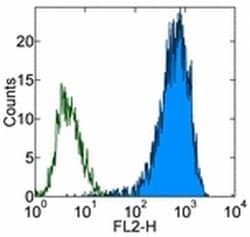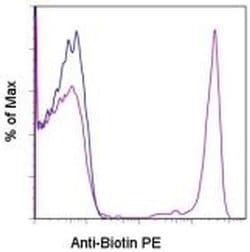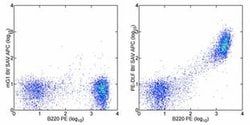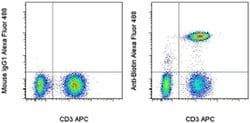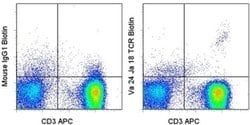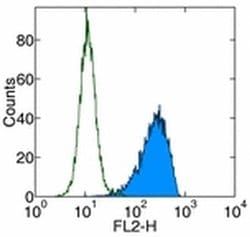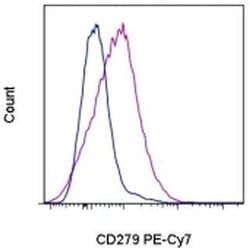50-112-8701
CD14 Monoclonal Antibody (61D3), Biotin, eBioscience™, Invitrogen™
Manufacturer: Invitrogen
Select a Size
| Pack Size | SKU | Availability | Price |
|---|---|---|---|
| Each of 1 | 50-112-8701-Each-of-1 | In Stock | ₹ 19,669.00 |
50-112-8701 - Each of 1
In Stock
Quantity
1
Base Price: ₹ 19,669.00
GST (18%): ₹ 3,540.42
Total Price: ₹ 23,209.42
Antigen
CD14
Classification
Monoclonal
Concentration
0.5 mg/mL
Formulation
PBS with 0.1% gelatin and 0.09% sodium azide; pH 7.2
Gene Accession No.
P08571
Gene Symbols
CD14
Purification Method
Affinity chromatography
Regulatory Status
RUO
Gene ID (Entrez)
929
Content And Storage
4° C, store in dark, DO NOT FREEZE!
Form
Liquid
Applications
Flow Cytometry
Clone
61D3
Conjugate
Biotin
Gene
CD14
Gene Alias
monocyte differentiation antigen CD14, myeloid cell-specific leucine-rich glycoprotein
Host Species
Mouse
Quantity
100 μg
Primary or Secondary
Primary
Target Species
Human
Product Type
Antibody
Isotype
IgG1 κ
Description
- Description: The 61D3 monoclonal antibody reacts with human CD14, a 53-55 kDa GPI-linked glycoprotein
- CD14 is expressed on monocytes, interfollicular macrophages and some dendritic cells
- Complexes of LPS and LBP (LPS-Binding Protein) bind with high affinity to monocytes through the surface CD14
- Applications Reported: This 61D3 antibody has been reported for use in flow cytometric analysis
- Applications Tested: This 61D3 antibody has been tested by flow cytometric analysis of normal human peripheral blood cells
- This can be used at less than or equal to 1 µg per test
- A test is defined as the amount (µg) of antibody that will stain a cell sample in a final volume of 100 µL
- Cell number should be determined empirically but can range from 10^5 to 10^8 cells/test
- It is recommended that the antibody be carefully titrated for optimal performance in the assay of interest
- Filtration: 0.2 μm post-manufacturing filtered
- CD14 is a 55 kDa GPI-anchored glycoprotein that is constitutively expressed on the surface of mature monocytes, macrophages, and neutrophils
- CD14 also serves as a multifunctional lipopolysaccharide receptor, and is released to the serum both as a secreted and enzymatically cleaved GPI-anchored form
- CD14 binds lipopolysaccharide molecule in a reaction catalyzed by lipopolysaccharide-binding protein (LBP), an acute phase serum protein
- The soluble sCD14 can discriminate slight structural differences between lipopolysaccharides and is important for neutralization of serum allochthonous lipopolysaccharides by reconstituted lipoprotein particles
- Further, CD14 has been shown to bind apoptotic cells, and can affect allergic, inflammatory and infectious processes
- Alternative splicing results in multiple transcript variants encoding the same CD14 isoform
- Diseases associated with CD14 dysfunction include mycobacterium chelonae infection and Croup.
Compare Similar Items
Show Difference
Antigen: CD14
Classification: Monoclonal
Concentration: 0.5 mg/mL
Formulation: PBS with 0.1% gelatin and 0.09% sodium azide; pH 7.2
Gene Accession No.: P08571
Gene Symbols: CD14
Purification Method: Affinity chromatography
Regulatory Status: RUO
Gene ID (Entrez): 929
Content And Storage: 4° C, store in dark, DO NOT FREEZE!
Form: Liquid
Applications: Flow Cytometry
Clone: 61D3
Conjugate: Biotin
Gene: CD14
Gene Alias: monocyte differentiation antigen CD14, myeloid cell-specific leucine-rich glycoprotein
Host Species: Mouse
Quantity: 100 μg
Primary or Secondary: Primary
Target Species: Human
Product Type: Antibody
Isotype: IgG1 κ
Antigen:
CD14
Classification:
Monoclonal
Concentration:
0.5 mg/mL
Formulation:
PBS with 0.1% gelatin and 0.09% sodium azide; pH 7.2
Gene Accession No.:
P08571
Gene Symbols:
CD14
Purification Method:
Affinity chromatography
Regulatory Status:
RUO
Gene ID (Entrez):
929
Content And Storage:
4° C, store in dark, DO NOT FREEZE!
Form:
Liquid
Applications:
Flow Cytometry
Clone:
61D3
Conjugate:
Biotin
Gene:
CD14
Gene Alias:
monocyte differentiation antigen CD14, myeloid cell-specific leucine-rich glycoprotein
Host Species:
Mouse
Quantity:
100 μg
Primary or Secondary:
Primary
Target Species:
Human
Product Type:
Antibody
Isotype:
IgG1 κ
Antigen: CD90.2 (Thy-1.2)
Classification: Monoclonal
Concentration: 0.2 mg/mL
Formulation: PBS with 0.09% sodium azide; pH 7.2
Gene Accession No.: P01831
Gene Symbols: Thy1
Purification Method: Affinity chromatography
Regulatory Status: RUO
Gene ID (Entrez): 21838
Content And Storage: 4° C, store in dark, DO NOT FREEZE!
Form: Liquid
Applications: Flow Cytometry
Clone: 53-2.1
Conjugate: eFluor 450
Gene: Thy1
Gene Alias: CD90; FLJ33325; T25; Thy 1.2; Thy1; Thy-1; Thy-1 antigen; thy-1 membrane glycoprotein; Thy1.1; Thy1.2; Thy-1.2; thymus cell antigen 1, theta
Host Species: Rat
Quantity: 100 μg
Primary or Secondary: Primary
Target Species: Mouse
Product Type: Antibody
Isotype: IgG2a κ
Antigen:
CD90.2 (Thy-1.2)
Classification:
Monoclonal
Concentration:
0.2 mg/mL
Formulation:
PBS with 0.09% sodium azide; pH 7.2
Gene Accession No.:
P01831
Gene Symbols:
Thy1
Purification Method:
Affinity chromatography
Regulatory Status:
RUO
Gene ID (Entrez):
21838
Content And Storage:
4° C, store in dark, DO NOT FREEZE!
Form:
Liquid
Applications:
Flow Cytometry
Clone:
53-2.1
Conjugate:
eFluor 450
Gene:
Thy1
Gene Alias:
CD90; FLJ33325; T25; Thy 1.2; Thy1; Thy-1; Thy-1 antigen; thy-1 membrane glycoprotein; Thy1.1; Thy1.2; Thy-1.2; thymus cell antigen 1, theta
Host Species:
Rat
Quantity:
100 μg
Primary or Secondary:
Primary
Target Species:
Mouse
Product Type:
Antibody
Isotype:
IgG2a κ
Antigen: CD140a (PDGFRA)
Classification: Monoclonal
Concentration: 0.5 mg/mL
Formulation: PBS with 0.09% sodium azide; pH 7.2
Gene Accession No.: P26618
Gene Symbols: PDGFRA
Purification Method: Affinity chromatography
Regulatory Status: RUO
Gene ID (Entrez): 18595
Content And Storage: 4° C, store in dark, DO NOT FREEZE!
Form: Liquid
Applications: Flow Cytometry
Clone: APA5
Conjugate: Biotin
Gene: PDGFRA
Gene Alias: AI115593; alpha platelet-derived growth factor receptor; Alpha platelet-derived growth factor receptor precursor (PDGF-R-alpha); alpha-type platelet-derived growth factor receptor; APDGFR; CD140 antigen-like family member A; CD140A; CD140a antigen; GAS9; MGC74795; OTTHUMP00000218656; PDGF A-chain; PDGF alpha chain; PDGF Receptor alpha; PDGF subunit A; PDGF-1; PDGFACE; PDGFR2; Pdgfr-2; PDGFRA; pdgfr-a; PDGFRA/BCR fusion; PDGF-R-alpha; PDGFR-alpha; platelet derived growth factor receptor alpha; platelet derived growth factor receptor, alpha polypeptide; platelet-derived growth factor alpha receptor; Platelet-derived growth factor receptor 2; platelet-derived growth factor receptor alpha; platelet-derived growth factor receptor, alpha polypeptide; rearranged-in-hypereosinophilia-platelet derived growth factor receptor alpha fusion protein; RHEPDGFRA
Host Species: Rat
Quantity: 100 μg
Primary or Secondary: Primary
Target Species: Mouse
Product Type: Antibody
Isotype: IgG2a κ
Antigen:
CD140a (PDGFRA)
Classification:
Monoclonal
Concentration:
0.5 mg/mL
Formulation:
PBS with 0.09% sodium azide; pH 7.2
Gene Accession No.:
P26618
Gene Symbols:
PDGFRA
Purification Method:
Affinity chromatography
Regulatory Status:
RUO
Gene ID (Entrez):
18595
Content And Storage:
4° C, store in dark, DO NOT FREEZE!
Form:
Liquid
Applications:
Flow Cytometry
Clone:
APA5
Conjugate:
Biotin
Gene:
PDGFRA
Gene Alias:
AI115593; alpha platelet-derived growth factor receptor; Alpha platelet-derived growth factor receptor precursor (PDGF-R-alpha); alpha-type platelet-derived growth factor receptor; APDGFR; CD140 antigen-like family member A; CD140A; CD140a antigen; GAS9; MGC74795; OTTHUMP00000218656; PDGF A-chain; PDGF alpha chain; PDGF Receptor alpha; PDGF subunit A; PDGF-1; PDGFACE; PDGFR2; Pdgfr-2; PDGFRA; pdgfr-a; PDGFRA/BCR fusion; PDGF-R-alpha; PDGFR-alpha; platelet derived growth factor receptor alpha; platelet derived growth factor receptor, alpha polypeptide; platelet-derived growth factor alpha receptor; Platelet-derived growth factor receptor 2; platelet-derived growth factor receptor alpha; platelet-derived growth factor receptor, alpha polypeptide; rearranged-in-hypereosinophilia-platelet derived growth factor receptor alpha fusion protein; RHEPDGFRA
Host Species:
Rat
Quantity:
100 μg
Primary or Secondary:
Primary
Target Species:
Mouse
Product Type:
Antibody
Isotype:
IgG2a κ
Antigen: CD279 (PD-1)
Classification: Monoclonal
Concentration: 0.2 mg/mL
Formulation: PBS with 0.09% sodium azide; pH 7.2
Gene Accession No.: Q02242
Gene Symbols: Pdcd1
Purification Method: Affinity chromatography
Regulatory Status: RUO
Gene ID (Entrez): 18566
Content And Storage: 4° C, store in dark, DO NOT FREEZE!
Form: Liquid
Applications: Flow Cytometry
Clone: J43
Conjugate: PE-Cyanine7
Gene: Pdcd1
Gene Alias: CD279; EGK_05005; hPD1; hPD-1; hPD-l; hSLE1; Ly101; mPD-1; PD1; PD-1; Pdc1; Pdcd1; programmed cell death 1; programmed cell death 1 protein; programmed cell death protein 1; programmed cell death protein 1-like; programmed death 1; Protein PD1; protein PD-1; sCD279; SLEB2; soluble CD279; systemic lupus erythematosus susceptibility 2
Host Species: Armenian Hamster
Quantity: 100 μg
Primary or Secondary: Primary
Target Species: Mouse
Product Type: Antibody
Isotype: IgG
Antigen:
CD279 (PD-1)
Classification:
Monoclonal
Concentration:
0.2 mg/mL
Formulation:
PBS with 0.09% sodium azide; pH 7.2
Gene Accession No.:
Q02242
Gene Symbols:
Pdcd1
Purification Method:
Affinity chromatography
Regulatory Status:
RUO
Gene ID (Entrez):
18566
Content And Storage:
4° C, store in dark, DO NOT FREEZE!
Form:
Liquid
Applications:
Flow Cytometry
Clone:
J43
Conjugate:
PE-Cyanine7
Gene:
Pdcd1
Gene Alias:
CD279; EGK_05005; hPD1; hPD-1; hPD-l; hSLE1; Ly101; mPD-1; PD1; PD-1; Pdc1; Pdcd1; programmed cell death 1; programmed cell death 1 protein; programmed cell death protein 1; programmed cell death protein 1-like; programmed death 1; Protein PD1; protein PD-1; sCD279; SLEB2; soluble CD279; systemic lupus erythematosus susceptibility 2
Host Species:
Armenian Hamster
Quantity:
100 μg
Primary or Secondary:
Primary
Target Species:
Mouse
Product Type:
Antibody
Isotype:
IgG

